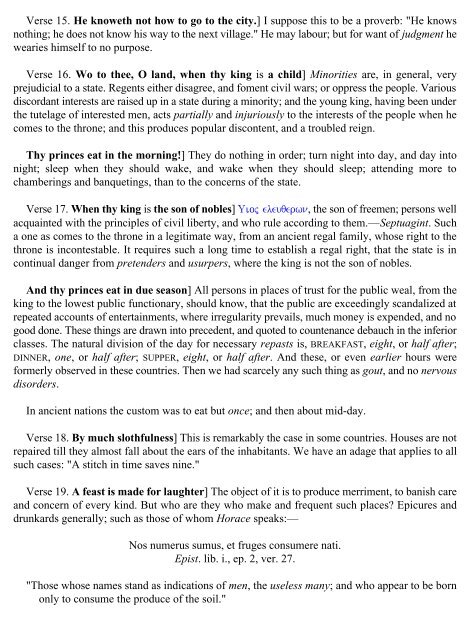Clarke's Commentary - Proverbs - Song Of ... - Media Sabda Org
Clarke's Commentary - Proverbs - Song Of ... - Media Sabda Org
Clarke's Commentary - Proverbs - Song Of ... - Media Sabda Org
Create successful ePaper yourself
Turn your PDF publications into a flip-book with our unique Google optimized e-Paper software.
Verse 15. He knoweth not how to go to the city.] I suppose this to be a proverb: "He knows<br />
nothing; he does not know his way to the next village." He may labour; but for want of judgment he<br />
wearies himself to no purpose.<br />
Verse 16. Wo to thee, O land, when thy king is a child] Minorities are, in general, very<br />
prejudicial to a state. Regents either disagree, and foment civil wars; or oppress the people. Various<br />
discordant interests are raised up in a state during a minority; and the young king, having been under<br />
the tutelage of interested men, acts partially and injuriously to the interests of the people when he<br />
comes to the throne; and this produces popular discontent, and a troubled reign.<br />
Thy princes eat in the morning!] They do nothing in order; turn night into day, and day into<br />
night; sleep when they should wake, and wake when they should sleep; attending more to<br />
chamberings and banquetings, than to the concerns of the state.<br />
Verse 17. When thy king is the son of nobles] ) , the son of freemen; persons well<br />
acquainted with the principles of civil liberty, and who rule according to them.—Septuagint. Such<br />
a one as comes to the throne in a legitimate way, from an ancient regal family, whose right to the<br />
throne is incontestable. It requires such a long time to establish a regal right, that the state is in<br />
continual danger from pretenders and usurpers, where the king is not the son of nobles.<br />
And thy princes eat in due season] All persons in places of trust for the public weal, from the<br />
king to the lowest public functionary, should know, that the public are exceedingly scandalized at<br />
repeated accounts of entertainments, where irregularity prevails, much money is expended, and no<br />
good done. These things are drawn into precedent, and quoted to countenance debauch in the inferior<br />
classes. The natural division of the day for necessary repasts is, BREAKFAST, eight, or half after;<br />
DINNER, one, or half after; SUPPER, eight, or half after. And these, or even earlier hours were<br />
formerly observed in these countries. Then we had scarcely any such thing as gout, and no nervous<br />
disorders.<br />
In ancient nations the custom was to eat but once; and then about mid-day.<br />
Verse 18. By much slothfulness] This is remarkably the case in some countries. Houses are not<br />
repaired till they almost fall about the ears of the inhabitants. We have an adage that applies to all<br />
such cases: "A stitch in time saves nine."<br />
Verse 19. A feast is made for laughter] The object of it is to produce merriment, to banish care<br />
and concern of every kind. But who are they who make and frequent such places? Epicures and<br />
drunkards generally; such as those of whom Horace speaks:—<br />
Nos numerus sumus, et fruges consumere nati.<br />
Epist. lib. i., ep. 2, ver. 27.<br />
"Those whose names stand as indications of men, the useless many; and who appear to be born<br />
only to consume the produce of the soil."
















